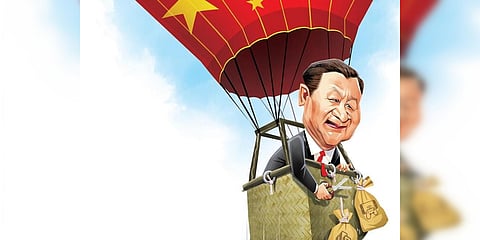

China. Such is the grip of the Party apparatus on the country that it still seems -- to borrow Winston Churchill's famous words about the Soviet Union -- like "a riddle wrapped in a mystery inside an enigma".
The other day Bloomberg News reported 37 million infections in a day (a number we were scratching our heads over - How was it arrived at? What was the basis of it?...). And now on Tuesday, another reputed agency AFP reports that jubilant Chinese are rushing to book trips abroad "as inbound Covid quarantine is set to end". Talk about mixed messaging.
What is undeniable though is the impact that Covid has had on the factory of the world.
Last week, the BBC ran a video of empty streets in Beijing as Covid cases spiked in the country. With visuals like these being beamed across, Mark Williams, the Chief Asia economist at Capital Economics, had little doubt that "China is entering the most dangerous weeks of the pandemic. The authorities are making almost no efforts now to slow the spread of infections and, with the migration ahead of Lunar New Year getting started, any parts of the country not currently in a major COVID wave will be soon. Cases may peak in the next two or three weeks in many major cities, with healthcare facilities under maximum strain shortly after. Mobility data suggest that economic activity is depressed nationwide. It will remain so until the infection wave has begun to subside."
The latest crisis comes after an already bleak period. From January to November, when the zero-Covid policy was in force, China's budget deficit hit a record $1.1 trillion, double the deficit in the corresponding period in 2021. Such a strain on government spending brought about by an attempt to shore up a slumping economy underscored the extent of the pain China was reeling under.
Writing in the Financial Times, Eswar Prasad, professor at Cornell University and senior fellow at the reputed US-based think-tank Brookings Institution, noted that zero Covid had "hit household consumption and the services sector especially hard".
And now we have the post-opening-up whammy brought on by soaring Covid cases hitting the nation.
Professor Prasad had observed in his article that unemployment had risen noticeably even before this and that exporting its way out of a downturn is not a viable option for China in a world that is increasingly grappling with recessionary risks.
Reality though might be even starker. China is probably facing a looming problem when it comes to holding on to existing export orders.
Apple, for instance, has been already dealing with many months of disruption following a Covid-19 outbreak from October in Foxconn's iPhone factory of factories in Zhengzhou, famously known as 'iPhone City'. That disruption is probably exacerbated now.
"We should be seeing a lot of operations get impacted (in China) by absenteeism, not just at factories, but at warehouse, distribution, logistic and transportation facilities as well," Bindiya Vakil, chief executive of Resilinc, a California-based group tracking more than 3 million components to provide supply-chain mapping services, was quoted as saying by the Financial Times.
Many companies are now thinking of shifting production out of China because of this -- a move they had been already contemplating to ensure that their risks were spread across the globe after the Covid outbreak first began and the ensuing war in Ukraine.
China's Minister of Commerce Wang Wentao acknowledged the threat in a piece in the state-controlled People's Daily on December 20 admitting that the global supply chain had become fragmented because of the pandemic and Russia's war in Ukraine. He went on to state that many countries are trying to "politicise and weaponise" the world economy in a push for a decoupling.
India might benefit from some of these stresses that China is coming under. When it comes to iPhones, an Indian industry intelligence expert believed that up to 18% of the phone assembly lines could shift to India by 2024 -- a 10% rise.
For the land of the dragons, on top of this possible blow to manufacturing is the need to deal with the threat of a drastic drop in demand, despite the low inflation in China. The culprit, according to an expert, is "low immunity and minimal safety nets" that could force Chinese consumers to avoid big purchases next year.
Smartphone shipment numbers, a key indicator of buoyancy in our mobile-driven world, bear the argument out. The official China Academy of Information and Communications Technology (CAICT) estimated that smartphone demand fell 27.2 per cent year on year in October to 23.8 million units.
January to October figures were even more dismal. 214.5 million units sold as against 275.3 million units the year before, when the world was ravaged by Covid.
All these are grim indicators for China and for the Party.